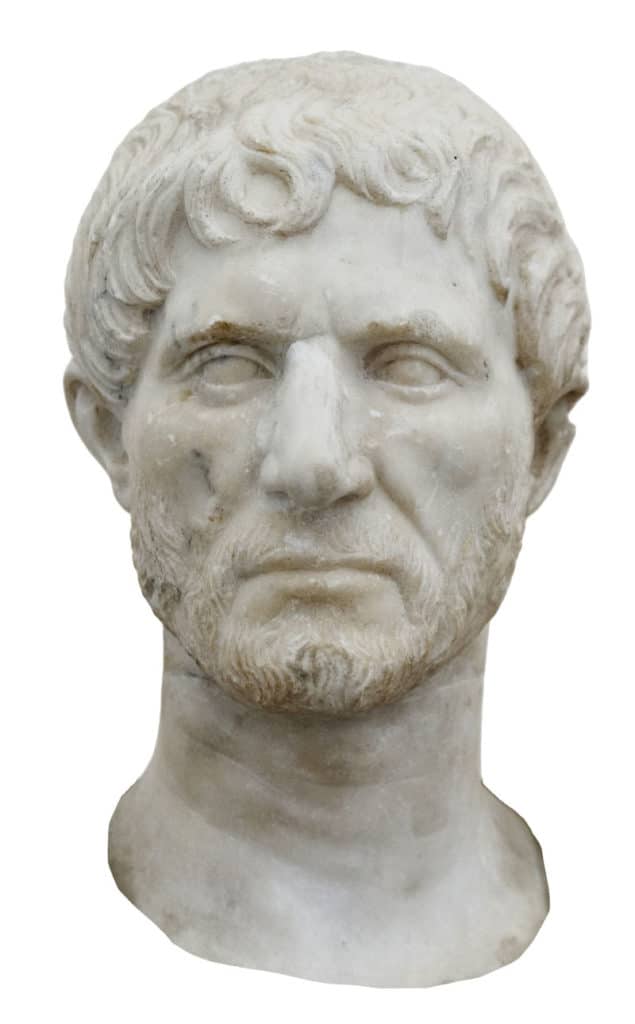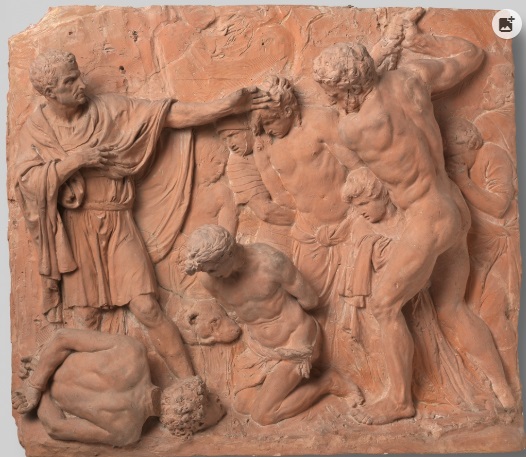Life:? – c. 509 BC

Founder of the Republic
by ‘Andraeus Papadopolus Dacicus Maximus’
According to Roman traditional history, Lucius Junius Brutus was the most important personality of the patrician “revolution” which overthrew monarchic rule in Rome and instituted the Republic. According to ancient sources, Brutus was the son of Marcus Junius and a sister of Tarquinius Superbus.
When he was still a child, he saw his father and brothers being executed by the tyrant and escaped solely by feigning mental insanity (the origin of his cognomen Brutus). Saved by such contempt he was regarded with disdain, being kept in the palace as a laughing stock. He grew up in the royal entourage, waiting for the right moment for vengeance.
Lucius Junius Brutus – by Livy
During a plague that almost overwhelmed Rome, Tarquin’s sons were sent to Delphi in order to consult the oracle and they took Brutus along, obviously to amuse themselves and forget about the boredom and the smaller inconveniences of the trip. Brutus brought as an offering to the god Apollo a coarse stick. But the great wisdom that Livy praised so much lay in his fine trick of hiding a golden scepter inside the stick.
Livy also reports that Apollo’s Pythia predicted the god would give the empire of Rome to the one who would first embrace his mother after the return. Brutus behaved wisely again, as he kissed the land of his ancestors immediately after entering Rome: the land, the mother of mankind. — We can clearly see in this poetic story Livy’s propagandistic role and why he was considered by the Romans to be their “national” historian. The job of praising the emperor and his origins as well as evocating the lost virtues of the ancestors (which could be regained under the protective hand of Caesar Augustus) were major themes in the literature of the time.

Lucius Junius Brutus as a Rebel
However, Lucius Junius Brutus did not need not feign imbecility for much longer, because the ill-fated rape and murder of Lucretia by Sextus Tarquinius, one of the king’s sons, gave him the opportunity to finally stage a quick move. He grew enraged when confronted with the dead body of this heroine, seized the iron stick that had served as the murder weapon against her chaste resistance, and swore to kill all the Tarquins, who were deeply unpopular in Rome, if not odious.
Brutus ran to the Forum, called the people to listen to his speech (it was his legal right as tribune of the Celers, and he could act on his own as long as the king was abroad), and proclaimed the abolishment of the Roman Monarchy and the enactment of the exile of the Tarquins.
The royal family quickly returned to the city in order to deal with the rebels – to them, he was little more than a usurper. They didn’t understand their lack of popularity and this sudden change in their fool’s personality, believing he was perhaps controlled by the senatorial magistrates who could be easily overcome. However, the Tarquins were abandoned by their soldiers, in spite of their vain efforts to keep control of the situation and take the city by surprise. Rome was a republic – res publica, meaning “public affair”.
Founder of the Republic
Whether Livy’s report has any trace of real historical information is not our main concern. It is however understood that this change in the government was in the hands of the aristocracy and therefore we speak of a patrician “revolution” — the small concessions which Lucius Junius Brutus and his government made to the Roman plebs were of propagandistic value and were meant to gain the support of all the social classes in order to permanently establish the new political forms.
Therefore, the power to the patrician families, which disposed of all the domination tools and tried to transform Rome into pneumonia, as had been the case with the Etruscan castes — that meant having all the former royal power in Rome concentrated in the hands of a few high-level families. However, by destroying the monarchy, they involuntarily prepared the ground for eventual political recognition of the plebeian class.
The executive power was handed over to two magistrates which at first were called praetores, but later received the title of consuls (see the Consular List). The first ones elected this way were Brutus and Lucius Tarquinius Collatinus, Lucretia’s widower. The republican government was at first undermined by violent attacks of the Tarquins, who were backed up by the Etruscan neighbors of Rome, and by internal conspiracies and power struggles.
It is said, in order to express the difficulty and patience which is associated with the doing of great things, that “Rome was not built in one day”. Such is the case concerning the establishment of the republic. Despite Brutus’ desperate efforts to install and consolidate the new government, many people were still not prepared for this sudden change.
A lot of work had to be done. Tarquinius Superbus was hated because he was an Etruscan, a foreigner, but it was reported that kingship in early Rome had been quite efficient. Brutus’ motives were not clear to the whole of Rome.
Therefore, the fact that Brutus was betrayed by his own sons – who wished to help the Etruscan monarchy to come back to Rome – is not to be regarded as strange (it was said that the conspiracy was revealed to Brutus by a slave named Vindex).
Death of the Founder
At this point, Livy shows again in great poetic words how the virtues of Brutus overwhelmed any of his parental feelings. In fact, one can think it was just a necessary evil that helped him destroy any opposition and show how determined he was against it. The fact is that he sentenced his sons to death and as consul presided over their execution. Livy reports that all the attendants were in favor of their pardoning and that Lucius Junius Brutus alone looked straight into his sons’ eyes just as their heads were being cut down by the lictors.
Lucius Junius Brutus, now more of a tyrant than Tarquinius Superbus had ever been, was not to meet success after success. The following year (508), he “got whacked” in combat against Aruns, one of the exiled king’s sons. His body was carried back to his ancestral land and entombed with royal pomp. The Roman matrons mourned for him one whole year, thus honoring the avenger of Lucretia as well as the founder of the Roman Republic. Lucius Junius Brutus didn’t survive for long but his Republic lived for five centuries.

History on Lucius Junius Brutus
Modern critics have seriously objected to this established story. One wonders how Lucius Junius Brutus, still a child when Tarquinius took the throne after just twenty-five years could have two sons able to conspire. How could a presumed idiot receive the dignity of tribune of the Celers (an office which, according to the legend, was created by King Romulus himself and which was abolished after the fall of the monarchy)? However, such cases of presumed mentally insane people who reached high levels of the social ladder, just because they were considered to be harmless, are not unique. One could easily mention the name of emperor Claudius or really insane leaders, such as Caligula and Nero.
The ancient version that Livy immortalized in his works might have been far from the historical reality, but the name of Brutus is invariably connected to the sudden changes that brought to an end the Roman royal era – the banishment of the kings and the creation of one of the earliest republican institutions.
The new form of government was so successful in governing that even the Caesars of later Rome when the republic fell into decline, could not entirely separate themselves from it. Monarchy continued to be deeply unpopular in Rome and its people believed that only barbarians could still accept the concept of kingship. All these facts explain why the emperors felt the need to hide their royal status behind republican titles and forms. – One can go as far as saying that the empire created by Caesar and Augustus was a republic led by a monarch.
It was claimed that the name Brutus had been an old Italic term meaning “rebel slave.” That could explain the name Brutium which was given to the southern extremity of Italy, which served as a refuge to fugitive slaves.
People Also Ask:
Who was Lucius Junius Brutus Why was he important?
Lucius Junius Brutus, (flourished 6th-century BC) is held to have ousted the despotic Etruscan king Lucius Tarquinius Superbus from Rome in 509 BC and then to have founded the Roman Republic.
Who was the famous Brutus in history?
Lucius Junius Brutus and Marcus Junius Brutus
What was Brutus’ real name?
Lucius Junius Brutus was the full name of the founder of the Roman Republic.
What Nickname did Lucius Junius Brutus Have?
Lucus Junius Brutus was known as the “Founder of the Republic.”

This article was written by a visiting contributor to the site. Contact us if you have an article you’d like to submit.
